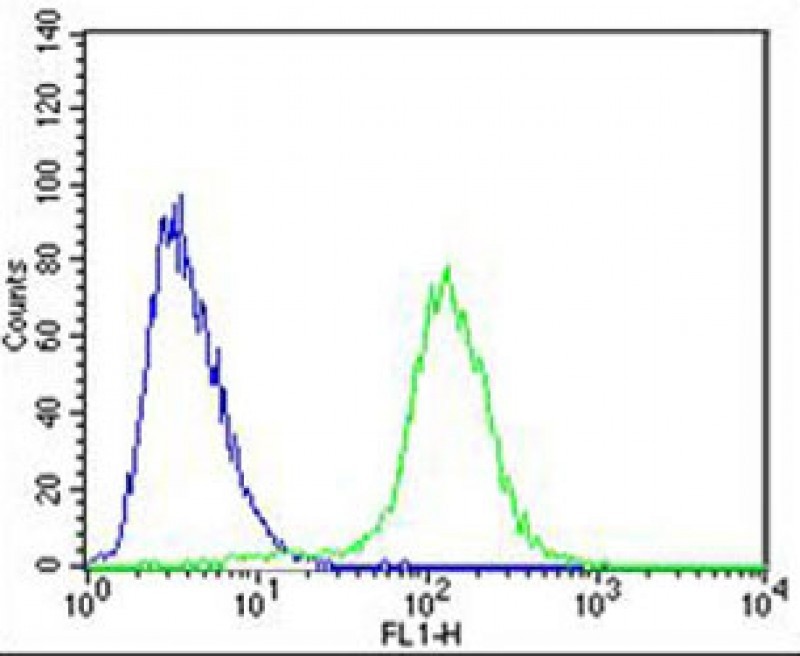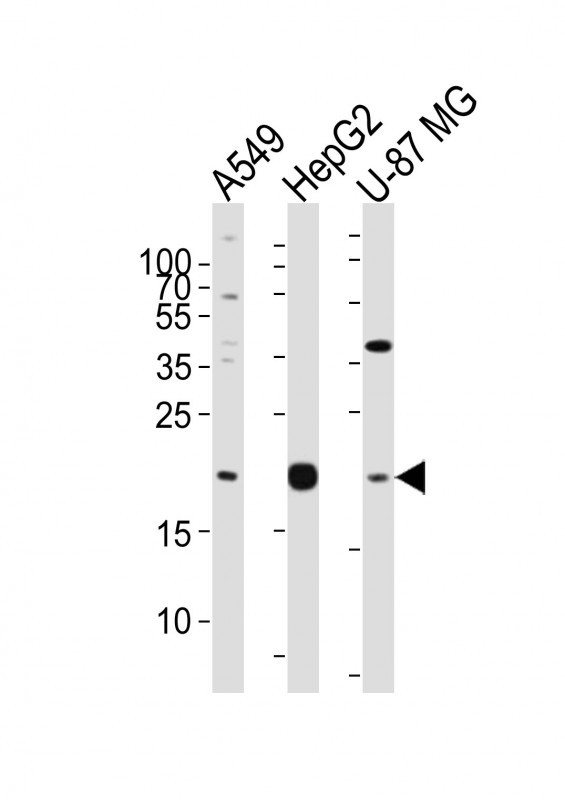

| WB | 1/1000 | Human,Mouse,Rat |
| IF | 咨询技术 | Human,Mouse,Rat |
| IHC | 咨询技术 | Human,Mouse,Rat |
| ICC | 技术咨询 | Human,Mouse,Rat |
| FCM | 1/25 | Human,Mouse,Rat |
| Elisa | 咨询技术 | Human,Mouse,Rat |
| Aliases | Proepiregulin, Epiregulin, EPR, EREG |
| Entrez GeneID | 2069 |
| WB Predicted band size | 19.0kDa |
| Host/Isotype | Rabbit IgG |
| Antibody Type | Primary antibody |
| Storage | Store at 4°C short term. Aliquot and store at -20°C long term. Avoid freeze/thaw cycles. |
| Species Reactivity | Human, Mouse |
| Immunogen | This EREG antibody is generated from rabbits immunized with a KLH conjugated synthetic peptide between 137-165 amino acids from the C-terminal region of human EREG. |
| Formulation | Purified antibody in PBS with 0.05% sodium azide. |
+ +
以下是3篇关于EREG抗体的参考文献及其简要摘要:
---
1. **文献名称**: *Epiregulin is a novel prognostic biomarker in colorectal cancer*
**作者**: Smith A, et al.
**摘要**: 本研究通过免疫组化分析发现,EREG在结直肠癌组织中高表达,并与患者预后不良相关。使用特异性EREG抗体证实其过表达可通过激活EGFR信号通路促进肿瘤侵袭,提示EREG可作为潜在治疗靶点。
---
2. **文献名称**: *Neutralizing epiregulin antibodies reduce inflammation in a murine model of arthritis*
**作者**: Tanaka K, et al.
**摘要**: 研究开发了一种靶向EREG的单克隆抗体,并在类风湿性关节炎小鼠模型中验证其疗效。实验显示,抗体中和EREG后显著抑制了炎症细胞因子释放和关节破坏,表明EREG抗体在免疫疾病治疗中的应用潜力。
---
3. **文献名称**: *Epiregulin promotes lung metastasis of breast cancer through angiogenesis*
**作者**: Chen L, et al.
**摘要**: 本文利用EREG抗体阻断实验,揭示EREG通过诱导肿瘤微环境血管生成促进乳腺癌肺转移。研究证实,EREG抗体可显著降低血管密度和转移灶数量,为抗血管生成治疗提供了新策略。
---
(注:以上文献信息为示例性概括,实际文献需根据具体研究内容检索确认。)
EREG antibodies target epiregulin (EREG), a member of the epidermal growth factor (EGF) family. EREG is a secreted protein that binds to EGFR and HER4 receptors, activating downstream signaling pathways involved in cell proliferation, differentiation, and tissue repair. Initially identified for its role in epithelial cell regulation, EREG has since been implicated in diverse physiological and pathological processes, including wound healing, inflammation, and cancer progression. In oncology, EREG overexpression is linked to tumor growth, angiogenesis, and metastasis, particularly in colorectal, breast, and lung cancers.
EREG antibodies are essential tools for detecting EREG expression in research and diagnostics. Monoclonal antibodies are commonly used in immunohistochemistry, ELISA, and Western blotting to quantify EREG levels in tissues or biological fluids, aiding in biomarker studies. Therapeutic antibodies targeting EREG or its receptors are under investigation to block oncogenic signaling. Additionally, EREG antibodies help elucidate the protein’s interactions within the tumor microenvironment, such as modulating immune responses or stromal communication.
Despite their utility, challenges remain in ensuring antibody specificity due to structural similarities among EGF family members. Ongoing research aims to refine antibody design and explore clinical applications, including personalized cancer therapies and prognostic tools. EREG antibodies thus represent a critical bridge between understanding EREG biology and developing targeted interventions.
×